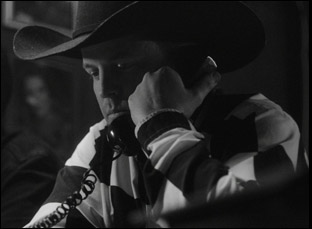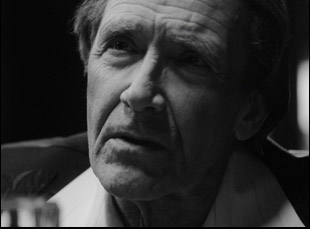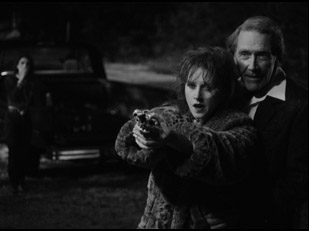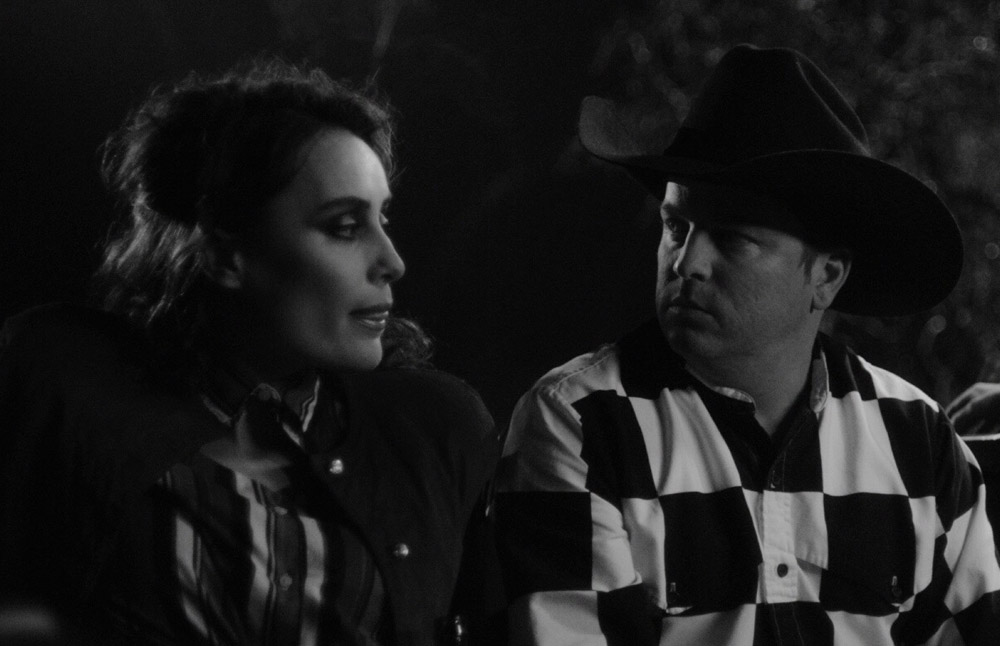From “Country Gold,” you might suspect the joke comes first when writer/director/star Mickey Reece doesn’t spare himself any indignities as Troyal Brux, a superstar beckoned to Nashville for a meeting with fellow royalty George Jones, unsure of the reasons when the two have never met yet not thinking twice about cancelling on a gig for the governor or missing out on quality time with his two boys upon receiving a letter from the legend. Outfitted in the billowy, ostentatious western wear that could be seen all over the CMT Awards stage during the mid-‘90s, Troyal is walking punchline, not all that different than the blowhards Danny McBride is known for playing, yet it might be surprising to learn that Reece and co-writer John Selvidge are rarely thinking of playing anything for laughs until well after they’ve followed their wily muse to wherever it leads, a path to gloriously strange places that become even funnier when it arrives with a straight face.
Although “Country Gold” goes down a road that no one can say they’ve taken before, Reece has himself to a degree, previously imagining how Elvis and Priscilla Presley coped with living at a remove from the rest of society when everyone knew who they were in the 2017 film “Alien” and though he wouldn’t fall under Garth Brooks’ spell as so many others did in his native Oklahoma, a curiosity about his mystique informs the flight of fancy taken in his latest film where Troyal can look like the “Friends in Low Places” crooner from the right angle and deals with the warped sense of reality that comes with achieving such stardom when Jones informs him of his plans to be cryogenically frozen a day after they have dinner. From the bizarre premise, which comes to include a mafia backstory for Jones, who was never known to associate with capos, “Country Gold” turns its silliness into an unusually insightful meditation on how disorienting a pursuit of the arts can become as it rewards panache as much as talent and regardless of stature has a way of instilling imposter syndrome, making Reece’s frequent allusions to other films as poignant as they are amusing.
After an equally eventual festival run as Troyal and George’s wild night out in Music City, the film is landing on Fandor for all to see and Reece spoke about how he came to put on a Stetson, how he ended up recruiting his crew for parts in front of the camera as well as behind it and the twists and turns in the production that made their way into such an unpredictable film.

We had always planned to do another one [after “Alien”], like figure out another celebrity and see what we could do with that [with] the same black-and-white feel that we did with the Elvis movie. During “Climate of the Hunter” Jake Snovel, who plays Troyal’s manager in [“Country Gold”], were driving back and hatching ideas and we’re like, “You know who hasn’t been in a movie? Garth Brooks, that’s an iconic figure with the black cowboy hat and the white-and-black checkered shirt and that would be fun to see in a movie.” We came up with the synopsis first, which is George Jones invites Garth Brooks out on the town in Nashville the night before he’s going to be cryogenically frozen, and it was like, “Alright, now we’ve got to write a script around that.” We’ll probably do a third one whenever the time’s right — I don’t know who it’s going to be, but we’ve been throwing around ideas, so we’ll see what sticks.
Is there actually any research at all that goes into these or do you just start writing based on whatever perception you have of these icons?
Yeah, Ben asked if he should be doing any George Jones research, and I was like, “No, just be the character on the page.” With the Elvis movie, we did quite a bit because the reality was was so wild we were able to incorporate a lot of the real stuff into that movie. Obviously, it’s completely historically inaccurate, but that one was more factual. This one was more playing with the idea of these characters. For instance, Garth Brooks doesn’t have two boys, and George Jones, we’ve created a fake wife for him, so we’re really just creating an alternate reality for these characters.
Did you know you’d be playing Troyal from the start?
No, it just wasn’t gonna work time-wise with the original actor I had, so I played it like he would have played it. But I looked like Garth Brooks, so we thought it would be funnier if I played him and also just be more resonant with the audience [when the film started to] mirror my own career and what’s changed in it since when I started making movies.
That was a really interesting component of it because there’s such consideration to how random careers can be – there’s allusions to wunderkinds who died before their work could be appreciated to Denise Crosby’s run on “Star Trek” where she ended up playing different characters. Was that actually a part of this from the start?
Not necessarily, but [after] we came up with [the idea for] the movie and then [you] just write characters and see where they go, not really coming up with any kind of plot or anything for them to do, [but then] it’s almost like “oh damn, we’ve been hanging out with this character for so long something needs to happen,” and it’s almost like a chore because we really just want to make these hangout movies, so these characters are on their own and start having those conversations together and it was more free-flowing writing. That’s what it came out more so than it was planned to it for it to be this commentary on an artist and how success accepts us or alters their art.

In every movie, I think I’m ripping off other movies, but what did we do? We had “Killing of a Chinese Bookie” when George goes back [in time to tell] his mafia story. Then of course there’s “Raging Bull” and “Boogie Nights” at the end with Troyal, and originally going into it, the whole thing was like, “So it’s Garth Brooks and George Jones and we’re making ‘Nebraska.’” And when we shot it and then when we went to color it, we had a half of the screen [as] “The Last Picture Show” and half of the screen was “Country Gold,” just trying to match all of those, all those tones that appeared in “The Last Picture Show,” so there were a lot of movie references happening there.
It seems like it must’ve been fun to put on some of these outfits.
Yeah, Jack Odell, our wardrobe person had a blast with this stuff. When I told her the movie we were making, she was like, “Oh, I’ve already got all that stuff,” and just presented all these options. That main shirt that I wear is a Mo Betta shirt, which is the company that all of Garth’s shirts that he wore back then [came from]. It’s a company here in Oklahoma, but I don’t think that they make clothes anymore, so it was something from eBay that [we] had to source from way back when, [or] play a pay a pretty penny for it, but it’s 100% accurate of what he would have wore.
You seem to have a tight-knit crew and a lot of your them end up pulling double duty as actors — is it interesting to think of roles for them?
Yeah, Kaitlyn [Shelby], our production designer announces the food in “Climate of the Hunter,” and then she has like a small part in “Agnes” as a waiter, so I knew I was going to give her a cameo at some point in [“Country Gold”]. And then whenever we decided to do the band scene, I was like, “Let’s just have a cinematographer Sam Calvin and our gaffer Andrew Appleyard and our sound guy Nick McDonald and our first AD Jeff Dubray [as] the band members because this makes sense. This is the band.
The way you use music in this is a lot of fun — it starts out really sincere and starts to warp. Was that an exciting part of this?
Nick Poss does the scores and that’s my favorite part of the process of making movies is toying with the score and just trying to figure out what kind of different twists and turns the scene can make just by having weird music that isn’t necessarily like on the nose, so you don’t necessarily know what emotion to feel. That’s always very fun to kind of keep it avant-garde in that way.

There was originally a scene [with] Joe Cappa, who plays Juno [where] he sees an alternate version of himself and then we see that alternate version go to his mother’s house and they’re eating beans and talking about the satellite. That happened because a similar [scene] was in the script, but it was him going home to a wife and it was kind of a funny scene written in there, but then when Joe came to town, he was like, “I’ve got to work with your grandma. We’ve got to do something with your grandma.” So I [said], “Okay, we’ll just rewrite the scene” and we went to my grandma’s house and shot that scene that wasn’t real — it wasn’t in the script. But they worked out as a kind of improv and that was a fun little little surprise that happened.
It’s one of the most memorable now in the film. What’s it been like getting this out into the world?
When we started at Fantasia, then months pass and then Fantastic Fest and then months pass and then we did Glasgow and then months pass and now it’s coming out, so it’s always a whirlwind [with these] ups and downs because you just don’t know if anybody’s watching the movie or if anybody’s responding to it. So I’m starting to get a taste of that now, doing this theatrical run and then [this week] when it’s out for the world to see, so I don’t know, but I’m optimistic.
“Country Gold” is now streaming on Fandor.




